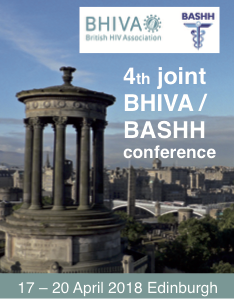Key changes to upcoming UK HIV pregnancy guidelines (2018)
1 May 2018. Related: Conference reports, Pregnancy, Guidelines, BHIVA/BASHH 4th Edinburgh 2018.
 Polly Clayden, HIV i-Base
Polly Clayden, HIV i-Base
An overview of the key changes to the upcoming UK pregnancy guidelines was presented at the Fourth Joint Conference of BHIVA/BASHH by writing group chair Yvonne Gilleece. [1]
The guidelines will be revised to include “treat all”, updated guidance on use of integrase inhibitors, infant PEP and infant feeding, an expanded section on psychosocial issues in pregnancy, a new section on postnatal management and community-friendly language.
The guidelines are still in draft form following public consultation and will be published later this summer after the writing group responds to comments.
The 2018 revisions include:
Antiretroviral therapy (ART) in pregnancy
- All treatment naive pregnant women are recommended to start lifelong ART in accordance with BHIVA adult and other guidelines worldwide (as this includes elite controllers, the section on elite controllers has been removed).
- Expanded guidance on use of integrase inhibitors: raltegravir 400 mg twice daily but insufficient data to recommend 1200 mg once daily; elvitegravir/cobicistat may be continued with close monitoring if a woman receiving it with undetectable viral load becomes pregnant but not recommended starting in pregnancy; dolutegravir 50 mg appears to be safe but still has limited data.
Psychosocial issues
- Comments on additional factors that might affect a woman living with HIV in pregnancy: family, asylum status and confidentiality.
- Antenatal HIV care should be delivered by a multidisciplinary team – the composition of which will vary.
- Assessment of antenatal and postnatal depression should be undertaken at booking, 4–6 weeks and 3–4 months postpartum as recommended in NICE guidelines.
- Postnatal contraception, breast feeding and cabergoline use should also be addressed antenatally.
Hepatitis
- Hepatitis B agents as part of ART should be continued as the potential risk to the foetus from drug exposure is outweighed by that of hepatitis flare, liver disease progression or HIV/HBV virological rebound and risk of vertical transmission.
- Although there are very limited data on tenofovir alafenamide in pregnancy, animal data do not indicate direct or indirect harmful effects.
- Women living with HIV/HCV should not be treated for HCV with ribavirin-based DAA therapies. Women who discover they are pregnant while receiving treatment should discontinue both therapies immediately.
- Women living with HIV/HCV of child-bearing age wishing to get pregnant should be prioritised for DAA-based HCV therapy.
Infant PEP
- Length of infant PEP has been shortened where risk of vertical transmission is very low.
- Very low risk is defined as mother has received ART for at least 10 weeks has two viral load tests <50 copies/mL during pregnancy at least four weeks apart and at 36 weeks gestation or more.
- If these criteria are met, infants should receive two weeks AZT monotherapy.
Infant feeding
- Exclusive formula feeding is still recommended.
- Updated infant feeding advice to include new data on breastfeeding and the emotional impact that not breastfeeding might have on women.
Postnatal management
- Opportunity to provide guidance on mental health assessment postpartum at 4–6 weeks.
- Ensure cytology and contraception provided or planned for.
- Testing of partner and/or other children if not already tested.
- Women not breastfeeding their infant should be offered cabergoline to suppress lactation.
Language
- Significant changes in the language used in the text, for example: vertical transmission vs MTCT; and woman living with HIV rather than HIV infected or HIV positive woman.
- Language received well in public consultation.
comment
Several presentations at the BHIVA/BASHH meeting showed real-world findings on HIV and pregnancy in the UK and revealed how clinical practice relates to the recommendations in the guidelines.
These are reported in the following article below. [2]
References
All references are to the Programme and Abstracts of the Fourth Joint Conference of BHIVA/BASHH, Edinburgh, 17–20 April 2018. Published in HIV Medicine, 19 (Suppl. 2), s5–s20.
http://www.bhiva.org/AnnualConference2018Presentations.aspx
- Gilleece Y. BHIVA HIV in pregnancy guidelines 2018. 4th Joint BHIVA/BASHH, 17-20 April 2018, Edinburgh. Oral presentations in BHIVA/BASHH guidelines section. Thursday 19 April 2018.
- Clayden P. Pregnancy studies at 4th Joint BHIVA/BASHH Conference. HTB 30 April 2018.
https://i-base.info/htb/34011

